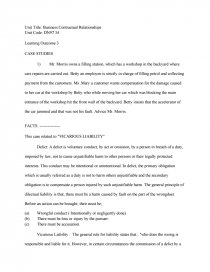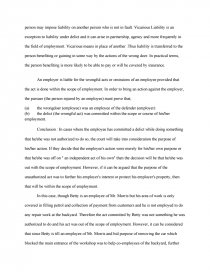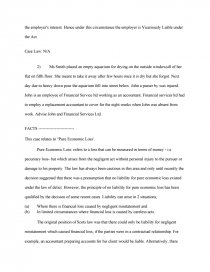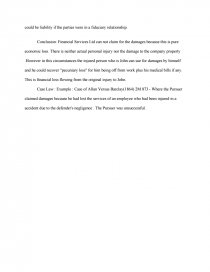Business Contractual Relationships
Essay by Woxman • March 28, 2012 • Essay • 1,023 Words (5 Pages) • 2,185 Views
Unit Title: Business Contractual Relationships
Unit Code: DN97 34
Learning Outcome 3
CASE STUDIES
1) Mr. Morris owns a filling station, which has a workshop in the backyard where cars repairs are carried out. Betty an employee is strictly in charge of filling petrol and collecting payment from the customers. Ms .Mary a customer wants compensation for the damage caused to her car at the workshop by Betty who while moving her car which was blocking the main entrance of the workshop hit the front wall of the backyard. Betty insists that the accelerator of the car jammed and that was not his fault. Advice Mr. Morris.
FACTS: ---------------
This case related to "VICARIOUS LIABILITY"
Delict: A delict is voluntary conduct, by act or omission, by a person in breach of a duty, imposed by law, not to cause unjustifiable harm to other persons or their legally protected interests. This conduct may be intentional or unintentional. In delict, the primary obligation which is usually referred as a duty is not to harm others unjustifiable and the secondary obligation is to compensate a person injured by such unjustifiable harm. The general principle of dilectual liability is that; there must be a harm caused by fault on the part of the wrongdoer. Before an action can be brought; their must be;
(a) Wrongful conduct ( Intentionally or negligently done)
(b) There must be loss or injury by the pursuer.
(c) There must be accusation.
Vicarious Liability : The general rule for liability states that ; "who does the wrong is responsible and liable for it. However, in certain circumstances the commission of a delict by a person may impose liability on another person who is not in fault. Vicarious Liability is an exception to liability under delict and it can arise in partnership, agency and more frequently in the field of employment. Vicarious means in place of another .Thus liability is transferred to the person benefiting or gaining in some way by the actions of the wrong doer. In practical terms, the person benefiting is more likely to be able to pay or will be covered by insurance.
An employer is liable for the wrongful acts or omissions of an employee provided that the act is done within the scope of employment. In order to bring an action against the employer, the pursuer (the person injured by an employee) must prove that;
(a) the wrongdoer (employee) was an employee of the defender (employer)
(b) the delict (the wrongful act) was committed within the scope or course of his/her employment.
Conclusion : In cases where the employee has committed a delict while doing something that he/she was not authorized to do so, the court will take into consideration the purpose of his/her action. If they decide that the employee's action were merely for his/her own purpose or that he/she was off on " an independent act of his own" then the decision will be that he/she was out with the scope of employment. However, if it can be argued that
...
...



